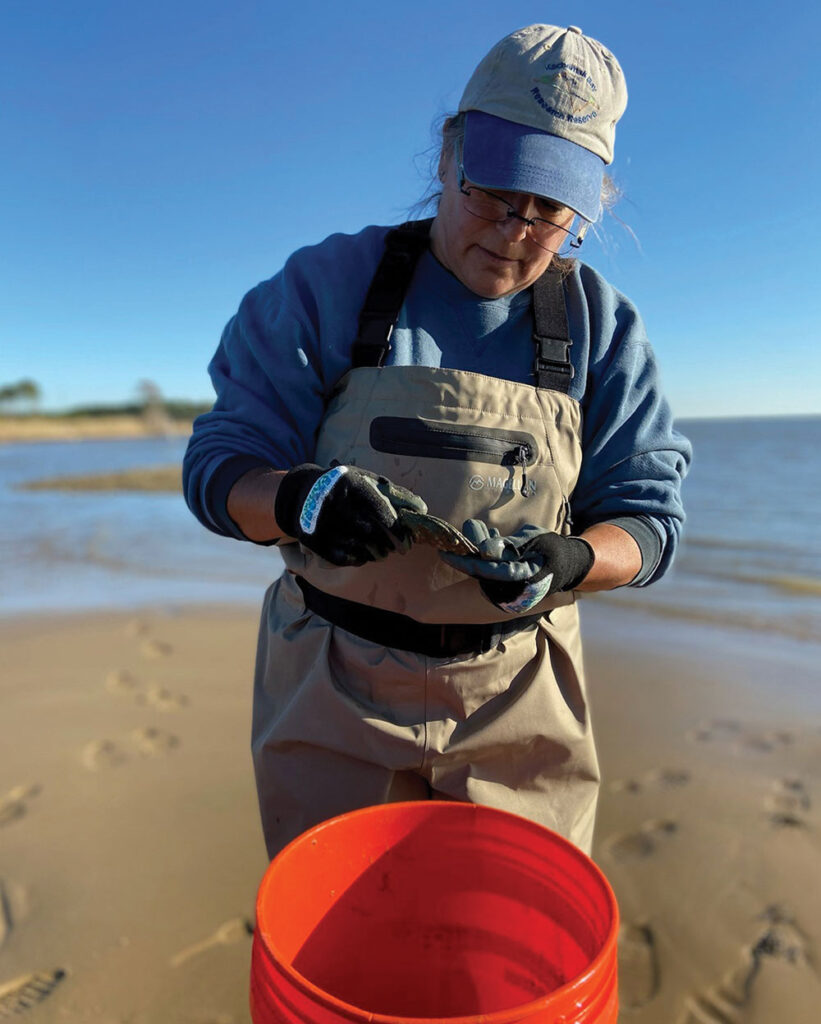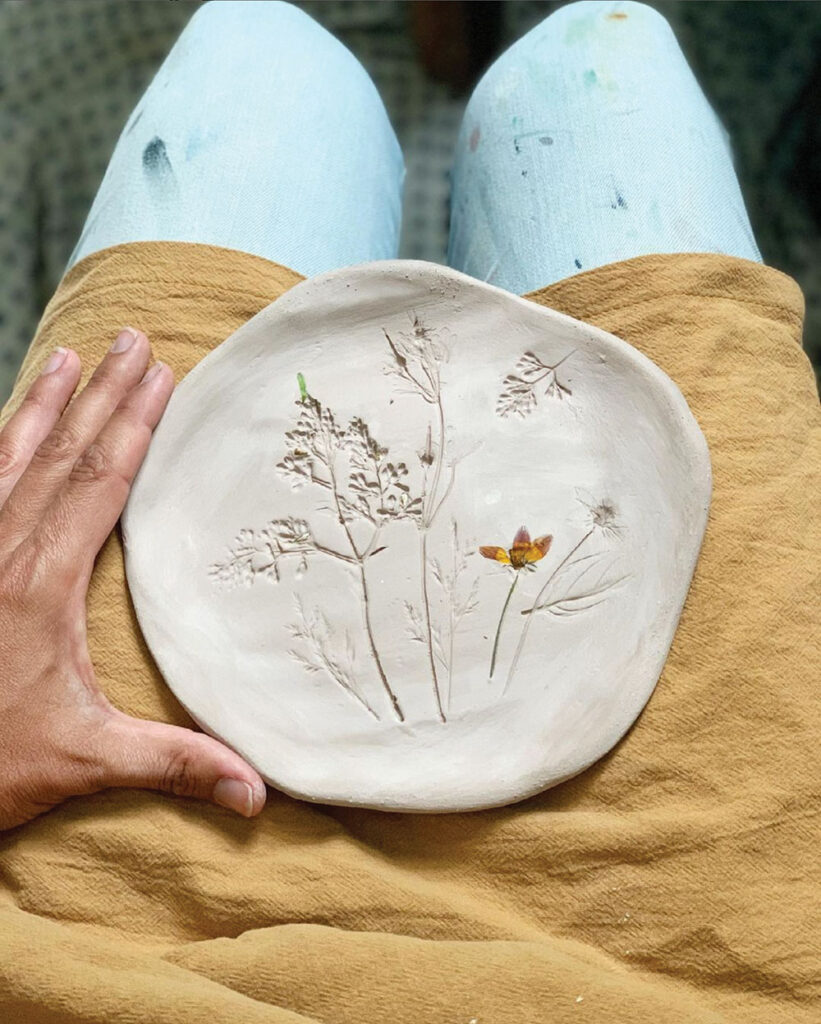
Coastal Alabama’s ecosystem is unique to Alabama. Aqua blue waters teem with marine life, Bay tides lap two counties, and woodlands and forests are home to exotic animals, many exclusive to us and nowhere else in the state.
Nature was designed to be self-maintaining, but at times it gets by with a little help from its friends. Here are nine of them, stewards of coastal Alabama’s earth, guardians of the Gulf and recipients of Mobile Bay Magazine’s 2022 Watershed Award.
Brian Jones
A YouTube search shows Dauphin Island Sea Lab’s Brian Jones as excited as his audience about the sea animals he’s lecturing about. Marine life’s health and well-being at the lab, and in the wild, are his passion.
“As curator of the Alabama Aquarium at the Dauphin Island Sea Lab, my primary responsibilities are animal care in the facility,” he notes. “Aside from making sure the critters are healthy and happy, our goal is to educate and inspire visitors with local animals and displays featuring the incredible habitats of coastal Alabama.”

Brian’s devotion is fueled by a lifelong love of the outdoors. He explains his career choice, recalling a high school field trip. “A professor took a group of us to visit research centers along the Gulf of Mexico,” the curator notes. “The trip included an excursion on the Dauphin Island research vessel in Mobile Bay. The diversity and beauty of this area surely influenced my plans to return and focus on this line of work.”
Though not everyone can be an aquarist, everyone, Jones believes, can help our environment. His solution is one word: Vote. “Vote for politicians who support environmental protection and conservation issues,” he says. “Make sure your local, state and national leaders share those values.”
The animal curator says he still gets daily enjoyment sharing someone’s first experience with a horseshoe crab, or pointing out how an alligator snapping turtle lures prey to its steel-trap mouth.” All in a day’s work.
Frankie Little
Roosters restaurant is a great place to eat and more; savory tacos, inviting margaritas and helping planet earth are all on the table.
“Roosters is a made-from-scratch restaurant specializing in Latin American and Caribbean food and drink,” says owner Frankie Little. “And we do everything we can to reduce waste from take-away containers.” Biodegradable packaging, limiting to-go utensils, and other enviro-friendly practices are utilized throughout Dauphin Street’s taco casa.
“I have been in the restaurant business for most of my adult life, and I love it,” Little adds. “But I never liked the constant waste of Styrofoam and plastic to-go containers.” When opening his restaurant, Frankie vowed to do everything possible to reduce waste. His message is straightforward: “Please refuse plastic bags and utensils when getting carry out food unless absolutely necessary.”
Little loves his work, noting, “Every time I meet someone who says how much they enjoy our food and compliment the staff, it’s the best feeling in the world.” Reducing unnecessary packaging, thus helping our waterways, is a great feeling, too.
Anna Keene Miller
There’s no place like home, and Anna Keene Miller strives to make ours better. As owner of Fairhope-based Keen Living, she offers ideas for energy-efficient homes, sustainable buildings and healthier habitats. Miller takes good environmental practices and brings it home — literally.
“I grew up in a family that enjoyed the outdoors,” she recalls about childhood. “My parents and grandparents taught me to not be wasteful and about the value of community.”
Miller moved to Fairhope in 2008 to work for an environmental nonprofit. After the BP oil spill, she felt a sense of urgency. “Changes were not happening fast enough,” she recalls. “I wanted to do something practical, something to make the financial case for sustainable choices.”
She remembered her college days, learning about sustainable buildings. “It all started coming back to me,” she adds. “I started my company, Keen Living, in 2017 to meet the unique needs of quality-driven innovators throughout the region.”
Miller enjoys helping people see what is possible. “The great thing about energy efficiency is that it benefits people in tangible ways,” the Fairhope business owner notes. “Sometimes, the initial cost is slightly higher for energy efficient/waste-reduction homes. But it is paid back over time, then it’s all savings.”
Nicole Love
Thompson Engineering’s Staff Scientist Nicole Love and team are dedicated to watershed management. “We are committed to the communities we serve,” Love says. “Our plans are aimed at restoring and conserving watersheds and improving water and habitat quality for the community.”
Services provided include engineering design, environmental consulting, construction management/inspections and materials testing. “We are currently working with a tremendous team of partners to implement several watershed management plans for the Mobile Bay National Estuary Program, including the Eastern Shore,” she adds.
Love originally worked in the medical field before enrolling in college and taking required biology courses. “A whole new world opened,” she recalls. “One class, invertebrate biology, was taught by a professor who was passionate about those organisms that no one ever really sees. I was immediately hooked.”
She enjoys collaborating with a variety of partners and the community to design ways to work together. “It is super rewarding to see local champions rise up and carry the work forward, even after the project ends.”
Carol Adams-Davis
The Sierra Club’s mission includes enjoying and exploring the wild places of Earth and protecting them by all lawful means necessary. Carol Adams-Davis is the Alabama Chapter Sierra Club’s Conservation Chair and Mobile Bay Sierra Club’s Vice Chair and Program Outreach.
“My fondest childhood memories took place on the waters of coastal Alabama in the early 1950s,” she says. The coastal environment is a treasure worth protecting, and Adams-Davis vows to do so.
“The Mobile-Tensaw River Delta and Mobile Bay waters are still beautiful and captivating, but they are at risk,” she warns. Stewarding our natural resources to safeguard them for future generations is imperative.
“There are incredible, abundant, diverse wildlife and vegetation to observe and seafood to feed our families,” Adams-Davis adds. The local Sierra Club leader recalls days of casting a net off a Mobile Bay pier to catch mullet and bait fish. She remembers when Mobile Bay turned silver with tarpon as far as the eye could see. She believes that community involvement, environmental awareness and public advocacy can help preserve the natural world, allowing future generations to make memories.

Friends in Low Places
One of the more unique recipients of the Watershed Award is man’s best friend — and it’s not Lassie. It is beer.
Friends in Low Places is a collaboration of breweries in Mobile and Baldwin counties that cheer on the work of the Alabama Coastal Foundation.
“After all, you can’t make great beer without great water!” laughs Brian Kane, managing partner of Fairhope Brewing Company.
“I think the biggest area for improvement is awareness,” Kane says. “Many people do not have a clue of the extent of environmental damage that goes on.”
He continues, “Part of our goal in making Friends in Low Places IPA is to get the name of the Alabama Coastal Foundation in the minds of beer drinkers all over the Alabama Gulf Coast. The ACF is a great way for people to learn what they can do to help our environment.”
The ACF mission is to improve and protect Alabama’s coast through cooperation, education and participation. Friends in Low Places, the event, launched at Greer’s St. Louis Market in Mobile last November. Friends in Low Places, the beverage, is described as a bright tropical fruit aroma with malty sweetness and an explosion of hoppy flavors. Let’s raise our mugs to all three.
Troy Ephriam
Troy Ephriam wears many hats: former mayor of Prichard, businessman and harvester of water. Working with others, Ephraim and Associates Environmental Consulting LLC rolled out the barrel, lots of them. Distribution of recycled containers are part of the Rain Barrel Project, which Ephriam has taken to heart and to Prichard.
The 50-gallon vessels collect rainwater for watering plants, small lawn irrigation, washing small vehicles, and to reduce stormwater flooding. Ephriam notes, “The tangible benefit of conserving and reusing captured stormwater allowed residents a chance to lower exorbitant water bills. This achievement for Prichard residents was a defining moment in environmental stewardship.”
Troy believes green values and community go hand in hand. The benefits are more than financial. “For me, it’s been a love for the natural world we live in, the air we breathe, the water we depend on for sustenance and the opportunity to live peaceably with nature and its enduring beauty.”
Knowledge is key. “Education is and will always be the answer,” the former mayor says. “We need to take time to understand why our world is facing the great debate of climate change, overpopulation, over consumerism and excessive waste.”
Rewards are many. “Being selected by the Mobile Bay National Estuary Program as the lead prime environmental company to spearhead the Western Delta Watershed Management Plan has been our signature achievement thus far,” Ephriam adds.

Judy Haner
In early 2010, Judy Haner, Marine Programs Director for the Alabama Chapter of the Nature Conservancy, came onboard with aftermath experience from Alaska’s Exxon Valdez Oil Spill. A few months into her new job, she faced another mishap — the BP Oil Spill.
She credits the Valdez experience for helping with the BP one. “Some people think a disaster happens and a month later a check’s in the mail,” Haner says about the Deepwater Horizon tragedy. “It doesn’t happen with your house insurance, and it sure doesn’t happen with something of the magnitude of BP’s spill.”
Haner says their goal at The Nature Conservancy is to protect Alabama lands and waters. “We do so in three ways: science to make the right decisions, advocacy to encourage our leaders to make the right decisions, and on-the-ground work that translates to effective conservation and restoration.”
Snorkeling in the Bahamas sealed the deal on Haner’s marine science future. “I found a whole world to explore,” she says. “My career provided me the opportunity to figure out creative ways to work with nature. After 12 years with The Nature Conservancy, I still wake up every day and think about how I could make the world a better place for the Coast of Alabama.” You can, too.
Mollie Hays Robinson

Mollie Hays Robinson is an artist of mixed media: canvas, pottery, plates and more. Each has a unique look and statement, yet often possess a common theme: the environment in art. Most of her works use all-natural materials.
“I am an artist with a nature-centered approach,” Robinson says. “I enjoy using foraged plant materials to make watercolors, inks and pottery.”
A job at greenhouses during summer break from Auburn University inspired Robinson’s blossoming. “I was an art major but then switched to landscape architecture because I wanted to take courses in ecology, horticulture and art.”
The Fairhope artist ponders, “I wonder if we could normalize environmentalism? We live in an ‘upgrade-centric’ culture where people generally care more about how things look versus what lasting impacts it places on the planet.”
Her natural approach to beautiful home decor makes a perfect zen.





